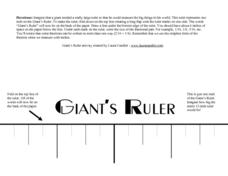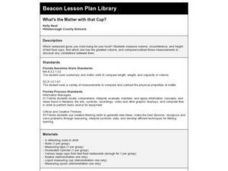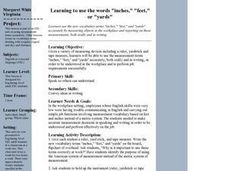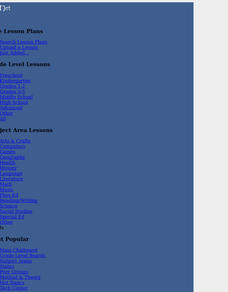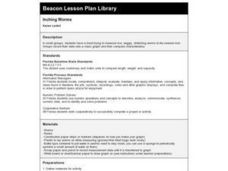Curated OER
Measure Up!
Discover ways to measure items without standard tools. In this measurements lesson, learners estimate how long certain objects are by measuring with a non-standard measuring tool. Students check their estimates with a ruler and share...
Curated OER
All About Measuring with the Metric System
Students discover the metric system through video clips and Internet activities. In this measurements lesson, students practice using the units of measure for the metric system and compare them to the less popular English system....
Curated OER
Measurement and Conversion of Units in a Recipe
In a cross-curricular measurement and literacy lesson, your class will identify and compare cooking measurement instruments. They read a recipe and sequence a set of similar instructions in which the steps have been mixed up....
Curated OER
Measurement Mania
First graders measure 10 different objects found in the classroom, including their own hands and feet, then record their findings. This is a fun lesson for students to experience measurement using a ruler and unifix cubes.
K12 Reader
Measuring Temperature
Fahrenheit? Celsius? What's the difference, and where did these two temperature scales originate? Your pupils will learn all about these topics by reading the passage included here. After reading, individuals respond to five questions...
Curated OER
Body Measuring Activity
Students explore geometry by participating in a measurement activity. In this human anatomy lesson, students identify the appropriate methods to measure human body parts and do so in class. Students create a bar graph from their class...
Curated OER
How Will You Measure Up?
Third graders use the appropriate units of measure when given a list of items to estimate and measure. They work in cooperative groups to locate, estimate, and measure given items using the correct unit of measurement.
Curated OER
Giant's Ruler
For this mathematics worksheet, students imagine that a giant needed a ruler to measure things in his world. they draw a line under the bottom edge of the ruler and under each mark, write the size of the fractional part.
Curated OER
Are You My Little Peanut?
Fourth graders explore the mass and length of peanuts by pretending to parent a peanut. In this mode, median and range lesson students graph their measurements and then use them to find the mode, median and range. Students discuss peanut...
Curated OER
What's the Matter with that Cup?
Fourth graders measure volume, circumference, and height of fast food cups, find which one has the greatest volume, and compare/contrast those measurements to discover any correlations between them.
Curated OER
Earth Science Regents: The Ellipse
Starting with the instructions to draw an ellipse, and with great pictures, this sheet should help your pupils learn the shapes and measurements involved. Using push pins and string, your class can discover the axis and focus points...
Curated OER
Does The Type of Mulch Used Affect Plant Growth?
Students measure, record and graph the plants they grow in a controlled setting. They feed and water the plants as needed and use the scientific method to evaluate the growth.
Curated OER
Don't Burst My Bubble
Middle schoolers practice using measuring techniques by examining bubbles. In this geometry lesson, students utilize mathematic formulas to discover the circumference and diameter of soap bubbles they blow. Middle schoolers...
Curated OER
Learning to Use the Words Inches, Feet, and Yards
Students use a variety of measuring devices including a ruler, yardstick, and tape measure to accurately measure objects in inches, feet, and yards. They report on these measurements, both orally and in writing.
Curated OER
Surface to Volume Ratios
High schoolers measure the rate of diffusion and to calculate the surface area to volume ratios of varying cell sizes. The lesson is very clearly organized with a useful student worksheet provided. They perform a lab experiment which is...
Curated OER
Death On Board La Belle: Finding Clues from Old Bones
Students practice analyzing skeletal remains for clues by using the Internet. In this scientific investigation lesson, students research the La Belle shipwreck using the Internet and written materials, later completing a Skeletal...
Curated OER
Inching Worms
Third graders have a blast trying to measure live, wiggly, stretching worms to the nearest inch. Groups record their data onto a class graph and then compare characteristics. They share their findings with the rest of the class. Fun lesson!
Curated OER
The Plant Restoration Project
Students discuss Restoration Ecology. They see that restoration can mean removing invasive, non-native plants and replacing them with native plants grown by Students.
Utah Education Network (UEN)
If the Shape Fits
Geometers juggle the idea of polygons. Using a game and manipulatives, they make trapezoids and irregular polygons. They review the algorithms for finding the areas of squares and rectangles. On day one, they find the area of trapezoids,...
Curated OER
How Can They Tell?
Pupils compare the characteristics of arcade tokens to those of a circulating U.S. quarter to determine how a video game can tell the difference between the two. They examine coins and arcade tokens very closely to observe the differences.
Curated OER
Home Sweet Home
Middle schoolers examine the change in the diversity of animals living in an area before and after development. In order to do this, students need to have access to an area near their school which is undeveloped. A good, "real life" lesson.
Curated OER
Human Fingerprints: No Two the Same
Sixth graders explore scientific observations by analyzing a group of data. In this fingerprint identification lesson, 6th graders identify the reasoning behind fingerprinting and create their own ink fingerprints. Students discuss the...







